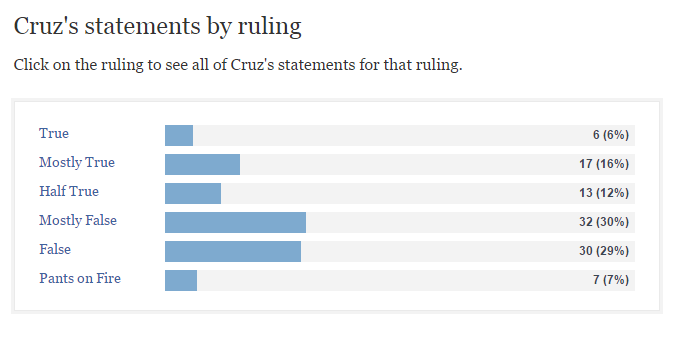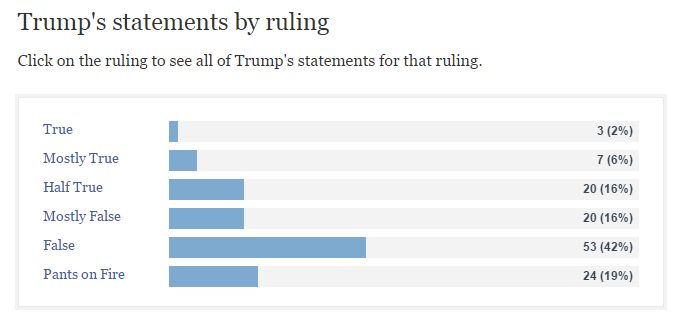Everybody makes mistakes. I certainly don’t expect presidential candidates to be flawless in their public statements. They speak constantly and answer questions on a broad spectrum of topics. They will misspeak.
On the other hand, a consistent record of incorrect claims implies either lack of care for truth or an unacceptable ignorance when it comes to important issues. Motives are hard to discern but fact checking can get us closer to the truth.
The folks at Politifact compiled a report card for the GOP candidates which I summarize here. John Kasich leads the way with over half of his claims (53%) being rated as true or mostly true. Cruz is a distant second with 22% being rated as true or mostly true. Trump is far behind with only 8% of his claims rated as mostly true or true. See the images below for the full report.
John Kasich

Ted Cruz

Donald Trump

If Trump gets the nomination, the GOP will reject the candidate who is the most factual, best liked, and most likely to beat Hillary in favor of the one who is the least factual, least liked, and least likely to defeat Hillary in November.
Brilliant.
Month: April 2016
Thomas Kidd: Ted Cruz's Traveling Companions Make Him a Non-Option
Today Baylor University historian Thomas Kidd opines on the plight of Republicans as the November election approaches. After reviewing the options on the GOP side (Trump, Cruz, Kasich), Kidd comes down about where I do: Kasich is (for him reluctantly, for me enthusiastically) the best choice. However, he echoes the worry of many Kasich supporters that a contested convention might not go to the Ohio governor.
Faced with a Cruz-Clinton match up, Kidd also shares my conviction on Cruz.
Sorry, folks. If it is Cruz vs. Clinton, I’m afraid that I’ll have to vote for a third party candidate, or not vote for president. In a way, it doesn’t matter what I do – Cruz would win Texas, for sure, with or without my vote. And I “get it” if many of my evangelical friends do support Cruz, and don’t share my alarm about the Barton-Beck connection. But for me, those traveling companions make Cruz a non-option.
Kidd didn’t mention Cruz’s father Rafael. Recently, Rafael Cruz told a Grove City College audience that the USA was the only nation on earth founded on the Word of God. Cruz has also said that the Constitution was divinely inspired.
Cruz and his supporters like to say that Cruz is a constitutional conservative. Given what Cruz’s advisors say about the Constitution (e.g., Barton says that the Constitution contains Bible verses quote verbatim), I have to ask what does it mean to be a constitutional conservative in the Cruzian sense. Given his advisors, I am not inspired to think he has a view which supports true freedom of conscience for all.
On the matter of religious liberty, Kidd has some reservations about Kasich. The answers I have heard from Kasich lead me to believe he has a balanced and reasonable view. Kasich has urged various groups to work together and has said that legislation may be needed to protect religious liberty. However, he is also sensitive to minority groups who understandably fear a loss of their rights in public accommodations.
Is There a Comeback In the Works for Tullian Tchividjian?
For those who are missing Tullian Tchividjian, his comeback might be underway.
In an April 1 church email, Tchividjian was listed as a speaker for a men’s breakfast last Saturday at Spring Hills Community Church in Santa Rosa CA. As of April 4, this announcement was posted on the church website. Then later in the week, Tchividjian’s name was removed from the event description.


After Tchividjian’s name disappeared, I asked Hunter Frederick, Tchividjian’s public relations consultant, if Tchividjian was speaking at the event. On April 7 he replied, “Tullian will not be speaking at Spring Hill (sic) Community Church this Saturday.” He added that the announcement in the email and on the website was “a misprint.”
As it turns out. Tchividjian did speak at the breakfast meeting. On April 9, Tchividjian gave a talk as previously announced and spent much of the prior week there. No one at Spring Hills responded to two emails sent to the email address listed on the church website.
Yesterday, Hunter Frederick confirmed that Tchividjian did speak at the breakfast.
I spoke with Tullian and he was invited to the church as a personal retreat of sorts. While he did speak at the breakfast it wasn’t “preaching” or speaking. My understanding is he was just introduced and that was about it.
Tchividjian spoke but it wasn’t speaking.
Mark Driscoll's The Trinity Church: Bouncy Houses, Matching Gifts, and a Late Summer Launch

After the first meeting of The Trinity Church, Mark Driscoll is moving full steam ahead toward the launch of the church in the late summer of this year. According to Driscoll’s most recent video update, The Trinity Church will launch in late summer with two services.
Until then, Driscoll invited interested people to participate in the work parties at the church and give money. He disclosed that a donor made a matching grant of $50k. Driscoll also said that people are driving in from California and as far away as Georgia to help get the church ready for the launch. Children’s ministry involves bouncy houses in the auditorium.
It must be surreal for former Mars Hill Church members to listen to the business-as-usual description of this church plant while Mars Hill is still shrouded in uncertainty and a lawsuit is pending against Driscoll and Sutton Turner.
Tennessee Bill Allows Counselors To Refer Based on Sincerely Held Principles
A controversial bill which would allow counselors to refer clients based on the counselor’s “sincerely held principles” was passed by the Tennessee Senate earlier this week. Already passed by the House, the bill now awaits action from Governor Bill Haslam. He has not declared his position on the final version of the bill.
Originally, the bill referred to a counselor’s “sincerely held religious beliefs” as being a reason why referral would be allowed. Earlier this week, the Senate voted to amend the bill to change that language to allow referrals due to a counselor’s “sincerely held principles.”
The most current version of the bill states:
No counselor or therapist providing counseling or therapy services shall be required to counsel or serve a client as to goals, outcomes, or behaviors that conflict with the sincerely held principles of the counselor or therapist; provided, that the counselor or therapist coordinates a referral of the client to another counselor or therapist who will provide the counseling or therapy.
The bill does not allow such referrals if the client is suicidal or homicidal. In such cases, counselors provide services.
While I opposed the earlier language as well, the amended standard of “sincerely held principles” would greatly expand the reasons counselors could discriminate against clients. Counselors who don’t like a client’s politics could fall back on their “sincerely held” political views to refer. One can imagine many scenarios where the views of a counselor and a client conflict.
The practical implications are frightening. Minority clients in rural areas may not be able to find a compatible counselor. Clients may lose trust in the profession and decline to seek help when needed. The legislation does not provide any restrictions on when such referrals may be conducted. What if a counselor learns of a conflict after 20 sessions into counseling? According to this bill, the counselor would be able to refer the client, possibly undoing weeks of progress.
According to the Chattanooga Times Free-Press, this bill has a direct tie to the case of Julia Ward at Eastern Michigan University. Representative Jack Johnson told the Times Free-Press that the American Counseling Association is to blame because they changed their ethics code to forbid referrals based on religious beliefs in response to the 6th Circuit case where Ward was kicked out of Eastern Michigan because she referred a gay client and refused to comply with the educational requirements to get experience counseling gay clients.
I was the expert witness on behalf of Ward in that case and I oppose this bill. Generally, I think counselors must refer clients when they believe they might be harmful to clients, even if the harm includes the effects of counselor bias. However, the problem in such a case is with the counselor and not the client. The focus of an ethical counselor must always be the benefit of the client, not the comfort or rights of the counselor. This bill is so broad that the counselor can refer simply because of a disagreement over ideology, an unacceptable deviation from the nature of the counselor’s role. It seems unavoidable that referred clients will experience stigma and lose trust in the profession.